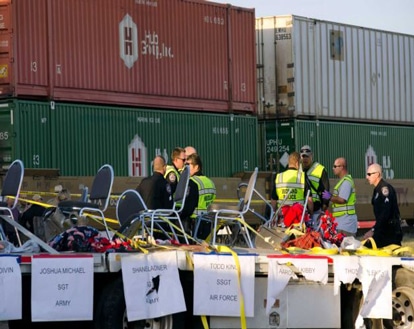Investigators have determined that an issue with the train crossing signal system may have been responsible for the mid-November train crash that killed four veterans and injured 16 others during a West Texas wounded veterans’ parade.
The issue was discovered after an inspection by private investigators and Union Pacific officials revealed that when the circuits were lengthened in 2006, they were overlapped with three other circuits connected to nearby crossings.
Under normal circumstances, sensors in the track determine train speed and activate the lights, bells and crossing guards when the train is close. When permitted train speeds are increased, as they were at the crossing in 2006, circuits are lengthened to register the approach of a train further in advance.
According to lawyers Kevin Glasheen of Lubbock and Bob Pottroff of Manhattan, Kan., the accident was a result of radio interference caused by competing track sensors linked to nearby crossings that delayed the warning.
“The failure to properly engineer these overlapping circuits is the source of the short warning problems. . . This defect is something that the railroad should have identified long ago,” the lawyers said in a statement.
However, Union Pacific claims that the truck driver was at fault.
“We would not be having this [discussion] had the truck not driven through the active railroad crossing signals,” said Union Pacific spokesperson Raquel Espinoza.
Engineering plans discovered inside a signal cabinet at the crossing revealed that a warning time of 25 seconds—five seconds less than the 30 seconds called for in the 1991 design plan—was in effect. The minimum federal time length is 20 seconds.
No evidence of state approval for the plans was reported found.
Glasheen and Pottroff plan to pursue negligence claims against the train company on the grounds that testing was not properly completed by Union Pacific.
“There’s no question that if this crossing was working as it was designed, that gate would have come down in front of the cab of the truck,” Pottroff said. “I don’t think there will be any good-faith argument to the contrary.”
For more information, visit OA Online.
Photo: Tim Fischer, Associated Press / Reporter-Telegram






